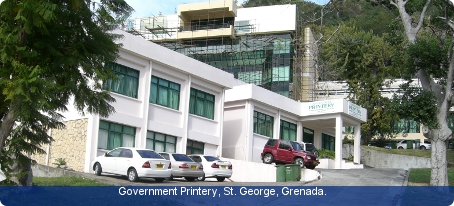Government
- Overview
- History

Grenada is governed under a parliamentary system based on the British model. It has a governor-general, prime minister and cabinet, a bicameral parliament with an elected House of Representatives and an appointed Senate. A wide range of civil and political rights are guaranteed by the Constitution together with the right to periodic free and fair elections with universal suffrage.
Elizabeth II is Queen of Grenada. The governor-general constitutionally and effectively acts as head of state on her behalf. Although in law the governor-general is the head of the executive and an integral part of the legislature, in practice he or she exercises all these powers on the advice of the prime minister and the cabinet.
The House of Representatives has 15 members elected by universal suffrage for a five-year term; the Senate has 13 members appointed for five years by the governor-general in consultation with the prime minister and the leader of the opposition.
The governor-general appoints as prime minister the member of the House of Representatives who appears most likely to command the support of the majority of the members of the House. This is generally the leader of the party that wins the most constituencies in a parliamentary election. The prime minister appoints the cabinet.
There is no local government in Grenada. For administrative purposes the island of Grenada comprises six parishes including St George’s.
Grenada has an independent judiciary. The Eastern Caribbean Supreme Court was established (as the West Indies Associated States Supreme Court) in 1967 with its headquarters in Castries in St Lucia, and is responsible for the administration of justice in its member states including Grenada. It comprises the High Court of Justice and the Court of Appeal.
The High Court has 16 judges, two of whom are permanently resident in the country. Less serious cases are heard in magistrates’ courts. The Court of Appeal is itinerant and generally sits three times a year in Grenada. The High Court’s jurisdiction includes fundamental rights and freedoms, and constitutional issues.
1950-2008
Grenada is an archipelago in the Caribbean, comprising the island of Grenada and some of the southern Grenadine islands. Inhabited by Carib Indians when Columbus discovered it in 1498, Grenada did not become a colony until more than a century later. Britain took control from the French in Grenada in 1763. Finally, in 1974, Grenada achieved full independence from the United Kingdom.
Grenada’s first political party, the pro-independence Grenada United Labour Party (GULP), was formed by Eric Matthew Gairy in 1950. The party went on to win the 1951 elections. In 1953 Herbert Blaize formed the Grenada National Party (GNP), which held power between 1957-61 and 1962-67.
When Grenada achieved independence, Gairy became prime minister. He was deposed by a coup in 1979 and replaced by opposition leader Maurice Bishop of the New Jewel Movement (NJM). In 1983 Bishop and several others were killed in a military coup.
In late 1983 the USA invaded Grenada at the request of the Organisation of Eastern Caribbean States (OECS). The governor-general took control of an interim administration and organised elections for a new government. In the 1984 general election, the New National Party (NNP), a four-party merger led by Blaize, defeated Gairy’s GULP and Blaize became prime minister.
In 2008 Dr Keith Mitchell of the NNP, who had served as prime minister since 1995, failed to secure an unprecedented fourth consecutive term. The NDC won a majority in the July 2008 general elections, and its leader Tillman Thomas became prime minister.



